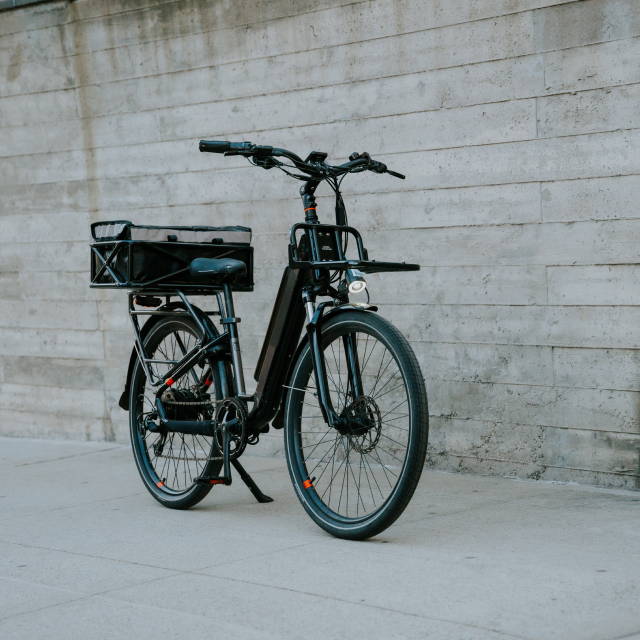For many people and daily commuters, e-Bikes can be an effective replacement for cars. Many commutes by car or other forms of transport are short enough to be comfortably substituted by riding an e-Bike. There are also cargo e-Bikes to carry passengers or haul heavy items but, of course, some car trips may not be appropriate to take via an e-Bike.
How Much Can You Save Riding an E-Bike vs. Driving?
Written by: Rémy Rossi | November 7, 2024 | Time to read 4 min
Replacing car trips with enjoyable e-Bike rides can help you switch from guzzling gas to conserving cash. Find out just how much you can save by hopping on an affordable electric bike instead of grabbing your car keys! Let's review together how much does an electric bike cost.

More about the Author: Remy Rossi
Rémy Rossi is a bike writer, mechanic, and educator who got his start in community-based bike shops and co-ops. With a decade in the industry, he still wrenches on bikes when he can and plays bike polo on a fixie.

👋 Do you know Upway?
Cost Comparison: E-Bike vs. Car
There are many reasons to ride an e-Bike instead of driving a car, and long-term savings is one of them. The thrill of pedal-assisted riding and a faster commute are fun benefits, but money talks, and reducing transport costs can make a big difference to your wallet.
Of course, buying an e-Bike will not immediately save you money because of the initial investment. However, lower charging and operating costs can help you save bucks over time compared to using a car for your commute or other frequent trips. Not everyone can fully replace their car with an e-Bike, but better city e-Bikes and well-connected cities are making the switch more possible than ever.
To help lower the cost of purchasing an e-Bike, many states offer incentive programs for residents interested in joining the pedal revolution, with more programs currently in the works. Upway is a great destination to discover your next e-Bike, brand-new or certified at unbeatably low prices, and with a one-year warranty. With models from top brands like Cannondale, Specialized, Aventon, and more, you can find the right e-Bike for commuting and errands around town.

Save at the pump… by avoiding it altogether
Before you continue reading, here are some e-Bikes you might like:
🤝 Why you can trust us for buying an e-Bike?
- Fair Prices: Find your next e-Bike at up to 60% off retail, in new or like-new condition.
- Quality You Can Trust: Each e-Bike is meticulously certified by our expert mechanics and backed by a 1-year warranty.
- Convenient Delivery: Enjoy doorstep delivery within a week. Not completely satisfied? Take advantage of our 14-day return policy.
Cost of charging an e-Bike
Testing 30 different e-Bike models, the study found that the average fuel cost for electric bikes was $0.22 per 100 miles. That calculates to single-digit cents to fully charge an e-Bike battery, which typically has a maximum range much less than 100 miles.
Of course, this number will depend on the cost of residential electricity in your area and the efficiency of your e-Bike. Long-range electric bikes are designed to go further on a single charge, ideal for high-mileage days or lengthy commutes.
Cost of fueling a car
Staying with electric-powered vehicles, the cost of charging an electric car was around $4.46 per 100 miles— that’s more than 21 times more expensive than charging an e-Bike! But wait there’s more. The study revealed that fueling a gas-powered car costs around $14.69 per 100 miles, nearly 68 times more expensive than an e-Bike. Replacing the short trips you take frequently via a car can help you save significantly on fuel costs.
E-Bike
Fuel cost
$0.22 per 100 miles
Electric car
Fuel cost
$4.46 per 100 miles
21x more expensive than e-Bike
Gas-powered car
Fuel cost
$14.69 per 100 miles
68x more expensive than e-Bike
Save on operating costs
Fuel isn’t the only thing that keeps e-Bikes and cars running. You’ll need to pay for regular maintenance and repairs while drivers are on the hook for additional costs related to parking and tolls.
Maintenance costs are difficult to predict accurately but it’s evident that car repairs are significantly pricier. E-Bikes will also eventually need new parts, but they are much more affordable. The most expensive repair is replacing the battery after several years once it eventually loses capacity over time.
If you are like many e-Bike riders who also own a car, riding your e-Bike more often will help you save on car maintenance. Replacing car trips with e-Bike trips puts less wear and tear on your car, leading to potentially big savings.
Riding your e-Bike also frees you up from having to pay for parking! Parking costs in densely populated cities can cost an arm and a leg, stacking up as one of the most expensive aspects of driving. Bike racks (and all the other places you can lock up your e-Bike) are always free and, to the best of my knowledge, will remain as such for the foreseeable future.

Ownership costs
We have a good understanding of day-to-day expenses associated with driving— high gas prices are great water-cooler talk— but there are many other costs simply due to owning a car. Even if your car sits in the garage, you’ll still have to pay things like insurance, license, registration, interest payments, and taxes. And this doesn’t even take into account the high rate of depreciation of new cars once you drive off the lot.
In the US, the national average for full coverage car insurance in late 2024 runs around $2,000 annually. Add onto that about $500-$600 for license, registration, and taxes as well as several hundred dollars from the paid interest on car payments. Both a car’s and e-Bike’s value will depreciate over time but will be a larger absolute amount because of a car’s higher overall value.
E-Bike riders are free from any license or registration costs, but a handful of states still require some additional paperwork or small registration fees. Check out our past articles on e-Bike license and registration requirements by state to see if they apply to you. Some electric bike owners choose to have e-Bike insurance to protect their investment, but the premiums are much lower than car insurance.
Seriously big savings
The exact amount you can save by riding an e-Bike depends on many variables, but some estimates place the number around $5,000 per year! Considering only fuel and maintenance costs, e-Bike users can still potentially save over $1,500 annually. Keep in mind, however, that these are rough estimates and everyone’s commute and transport needs are unique.
I think it’s fair to say, though, that the overall cost of riding an e-Bike pales in comparison to the cost of owning a car. And remember e-Bike’s extra benefits from physical activity and exercise as you reach your destination— maybe even enough to skip that costly gym membership?
💸 Want to sell your electric bike?
- In case you didn't know yet, you can sell your e-Bike to Upway and get your cash in 3 simple steps.
- Want an estimation -> It takes only 3 steps to complete this form.
Frequently Asked Questions
Can an e-Bike replace a car?
Are e-Bikes good for the environment?
Compared to gas-powered vehicles, e-Bikes are considered a much more energy-efficient form of transport. Electric bikes still require electricity to charge the battery but do not produce emissions while riding. E-Bikes are generally viewed as environmentally friendly, but when it comes to saving the planet, nothing beats a traditional bicycle!
Are e-Bikes worth it for commuting?
Definitely! E-Bikes can provide the right balance of comfort, speed, and cost-effectiveness on your daily commute. Electric bikes are faster than standard bicycles and require less effort on the climbs so you can arrive at work or school sweat-free. Pedal-assisted bikes are also cheaper to operate than cars and can help you save money on parking or public transit.
Key Takeaways
- Save Big on Fuel Costs: Riding an e-Bike costs as little as $0.22 per 100 miles, making it up to 68 times cheaper than a gas-powered car and 21 times cheaper than an electric car.
- Lower Maintenance and Operating Costs: E-Bikes reduce the need for costly car maintenance, parking fees, and insurance—helping you save significantly over time.
- Potential for Serious Annual Savings: Switching to an e-Bike for short trips and commutes can save you an estimated $1,500–$5,000 per year, while also benefiting your health and the environment.


